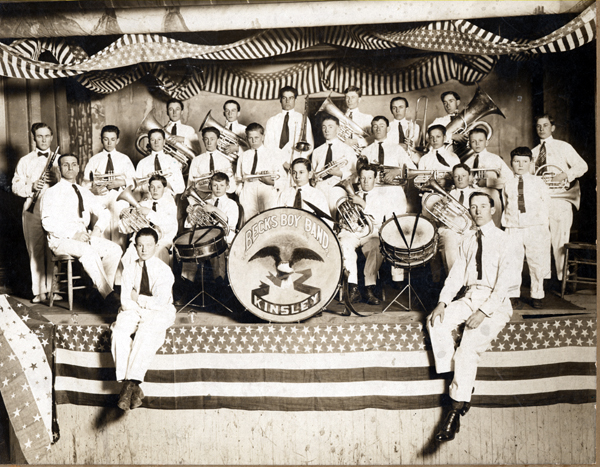
Lester M. Beck was born about 1877. He came from Illinois with his parents and nine brothers and sisters to Wheatland Township, Ford County, just northwest of Offerle. He grew up farming with his father there. Despite having only an 8th grade education, he would come to influence many lives in Kinsley through his love of music.
Kinsley was settled by people who had talent in music, theater, and poetry. In researching Lester, I came upon A. J. Hatch, a Wells Fargo express messenger on the Santa Fe, who decided to make his home in Kinsley. I believe he met his wife, Lydia Schou, here. Hatch was described as “a fine musician and under his skillful touch the grand old organ of which our Congregational friends are so proud, fairly talks to the audience” (Kinsley Mercury, May 9, 1889).
In 1891 Hatch opened a music store and a workroom for repairing pianos and organs. He gave singing and music lessons and organized an orchestra. Orchestras at this time not only gave concerts but were also used for dances. I discovered that in 1892 Lester’s younger brother Charles was playing in the orchestra. In 1903, Hatch began directing Kinsley’s coronet band. I believe that it was “Professor” Hatch who taught Lester to sing, play the cornet, French horn, and trombone.
Around 1900, Lester moved into Kinsley and went to work as a salesman for Edwards, Noble & Co. (location at Circle K Auto Parts). Lester Beck probably met Lenna Evans through their common interest in music. She was a talented young lady who sang, played an instrument and participated in dramatic productions.
One night, after band practice, Lester “slid his horn under the bandstand and walked home with a young lady (probably Lenna). Later he returned for his instrument and was surprised to find that it had turned up missing. The marshal latter picked up a couple of hobos carrying the instrument towards the depot. He was so well-pleased at finding the tooter that he forgot to arrest them” (Kinsley Graphic, July 24, 1903).
People were not surprised when on Sunday evening, May 6, 1906 Lester (age 28) and Lenna (age 22) were married in the Methodist parsonage. They would not have any children, and in January, 1912, Lester filed for divorce. He charged her with extreme cruelty and gross neglect of household duties, unwarranted jealousy and unreasonable requests with fits of crying and fainting which made life unbearable. The divorce was granted and Lenna went to live with her parents and brother in Joplin, Missouri.
Meanwhile, A. J. Hatch moved his family to Pratt in 1905, and Lester became part of a new and second orchestra in Kinsley.
In August, 1912, Lester took it upon himself to form the Kinsley Kid Band. Its members were twenty-six young men, age 9 and up. Lester required and helped them pick out quality instruments. The band gave its first public performance on December 7, 1912. After that, the name was changed to Becks Boy Band or B.B.B. The band performed from 1912 to 1919 and gained a state-wide reputation playing concerts in the park, at churches, on Decoration Day, and for social and club events throughout the area.
The band, now numbering 34 members, was invited to perform at the Kansas State Fair on Sept. 15, 1913. Beck said, “Everything seemed to go just right. The boys never did so well and I certainly was proud of them. They went through music without a slip that they had stumbled over at home.”
The article goes on to say, “And the crowd, too, appreciated the work of the boys particularly and very naturally the smaller ones and a good many nickels and dimes found their way to the boys’ pockets during the day. But this was not the only expression of appreciation received. Several times during the day enthusiastic women would grab one of the youngsters in their motherly arms and imprint a hearty kiss on a fair young face. The boys had a fine time and their work justifies our prediction a few weeks ago that they would bring honor to themselves and their town” (Mercury, Sept 16, 1913).
On March 21, 1914, Lester would again try marriage, this time to Wave Leith Shaffer, a 1908 Kinsley High School graduate.
The band played its last concert in June of 1919 for the Old Settlers Picnic. That month, Lester and Wave Beck moved to Dodge City where he worked as a salesman. They lived out their lives in Dodge City and are buried in Maple Grove Cemetery.
It would be hard to estimate the impact Lester Beck had on the young men of Kinsley during the seven years Becks Boy Band performed.
